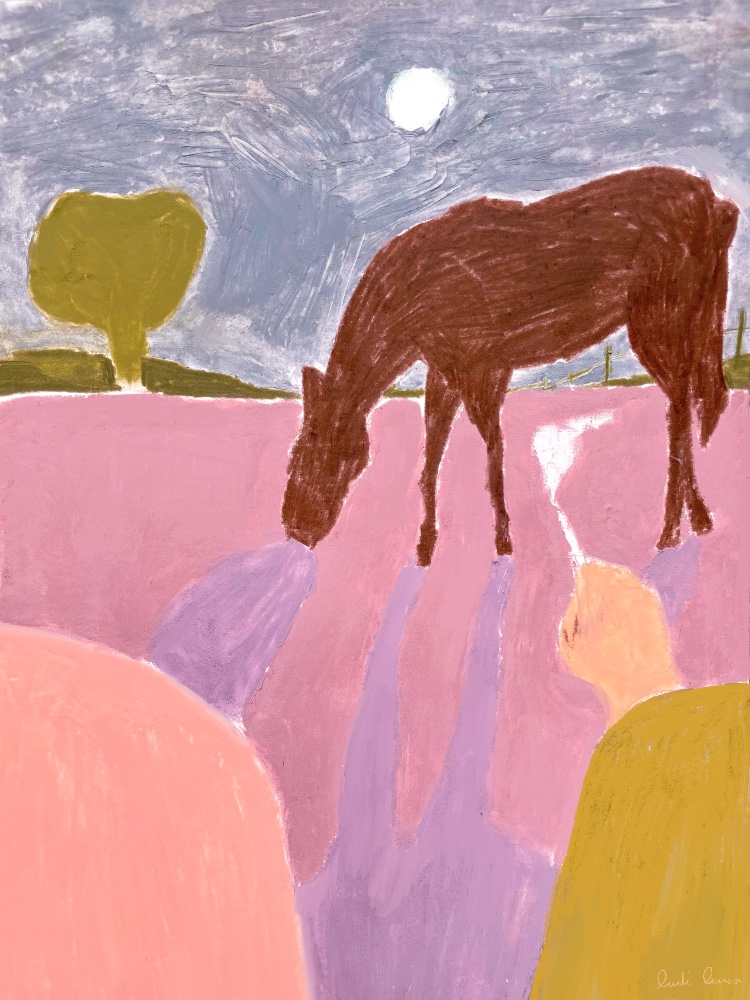People Believe What They Want to Believe

artwork by Ludi Leiva
Spring break of 1966, I had agreed that Mark, a kid from Knoxville in my dorm at Memphis State, could ride with us when my parents picked me up. When Mark found a ride with a new girlfriend instead, he asked if his friend Ben Moneymaker could ride with us. Ben came from Providence in Reed County, a little north of Knoxville. After meeting Ben, I said yes. He seemed like a nice guy. Wholesome looking with a businessman’s haircut (long hair just beginning to arrive on campus). Talkative, though. I meant to tell Ben my Mom came from Reed County, too, but he talked so much I didn’t have a chance to.
On the road to Knoxville, Dad drove with Mom in the front, Ben and me in the back.
“I appreciate the ride, Mr. and Mrs. Roebuck. I would hate for my mother to be alone at Easter, but I really couldn’t afford a plane ticket, and the bus ride is kind of brutal. I can afford to pay my share of the gas, though, so let me know what I owe.”
“We’ll settle up later, Ben. So your mother’s alone?”
“Yes, Mr. Roebuck. I don’t have any brothers or sisters. My dad passed away a few years ago. When I was twelve. You may have heard of him. Paul Moneymaker?”
“Of course. The state legislator from Providence. He was a rising star.”
“Thank you for saying so. I’m very proud to be his son.”
“It must be rough on your mom, with your dad gone.”
“Yes, it is, Mrs. Roebuck. Dad did all right, but with him dying so young, he didn’t leave my mom a lot in the way of finances.” He went on in great detail about his family situation.
We got to our house in Knoxville that afternoon. Mrs. Moneymaker arrived half an hour later. Dad told Ben not to worry about paying for gas, and we agreed to give him a ride back to Memphis at the end of spring break.
*
We started the drive back to Memphis talking sports, fishing, and, finally, politics. Mostly Ben talked. About halfway between Nashville and Memphis he began talking about Reed County. We’d never gotten around to telling him that Mom came from there. I was driving and Ben sat in the front passenger’s seat. As Ben talked about the lousy schools in Reed County, the lack of culture, and the backwardness of the people, Mom and Dad were quiet. I assumed they were sleeping.
Ben brought up the corruption of law enforcement in Reed County. I said, “What about those raids they did up there on the roadhouses and bootleggers?”
“First off, Jimmy, the state is the one leading the way on that. If it was up to the county, none of those raids would have happened. Second, even the state can’t make any headway against the power structure.”
“I thought they got a conviction on that guy Frank Perkins.”
“Frank is a small fish. He’s taking the fall so the big fish can get away. The roadhouses were open again a couple of weeks after the raids ended and the big fish kept on making money.”
I said, “Who’s the big fish?”
“A guy you never heard of, Kirby Hillsman.”
Kirby Hillsman was Mom’s only sibling, her older brother. I looked in the rearview mirror to make sure Mom and Dad still slept, but they were both wide awake. Dad stared ahead impassively. Mom looked out the window, appearing absorbed in the monotonous West Tennessee landscape. Ben hadn’t noticed my distress and moved on to expounding on politics in Knoxville.
Arriving in Memphis, we dropped Ben at his dorm and went downtown for lunch. On the way to the restaurant, Mom said, “I see Ben subscribes to the folklore of Reed County.”
“You mean about Kirby?”
“Yes. It’s true he was friends with Frank Perkins. Some people have built that up into Kirby being some kind of kingpin or something. That’s a good lesson for you. People you associate with, even casually, give you a reputation.”
Her calm, confident voice assured me. Besides, Kirby was obviously just a farmer. His usual wear consisted of jeans or khakis and flannel shirts. He did drive a big, late-model car, but he didn’t have a mortgage to pay. Since he and Jean had no kids, he could afford a big car.
When I saw Ben around campus the rest of that year I meant to straighten him out about Kirby but kept putting it off.
*
Back in Knoxville, I started a summer job with the state highway department. The weekend for our annual family pilgrimage to Mom’s old home arrived. Knowing that my uncle knew Frank Perkins, even if not in the way Ben had said, made the trip more exciting than usual.
The tiny clapboard house that Mom and Kirby were raised in had been torn down after Kirby and Jean married. A brick ranch-style house had replaced it.
Jean served iced tea on the patio and excused herself to go pick up the carryout barbecue.
After lunch I went on a walk around the farm by myself, which I did every year. This time, I found myself trying to calculate how much income Kirby could earn on the farm. There were no crops, just sixty acres of pasture. At the same time, there was no livestock, except for an old walking horse that Jean rode. When Mom and Kirby were kids the farm produced vegetables and eggs to sell at the market. Even with hard work they barely got by.
I walked to the barn. There was no tractor or any other farm equipment and never had been that I could recall. I found Jean there, putting fresh straw down in the horse’s stall. She was smoking, which she didn’t do in the house when we visited.
“Hi, Jimmy. Doing your annual inspection tour?”
“Yeah. Just checking things out. How’s old Rider?” That was the horse, C. C. Rider.
“Hangin’ in there. He’s twelve years old now. He’s got a few more good years in him. I’ve had him since he was a colt.”
After we chatted for a while I said, “I remember there used to be chickens around here. I wonder what happened to them.”
“Oh, I had Kirby get rid of those darn things. They ruin your yard. They didn’t produce many eggs, and none in the winter.” The chickens had disappeared when I was in fourth or fifth grade, but I had never seen Jean until her and Kirby’s modest wedding when I was in high school. Now I realized that she must have been living with Kirby before they got married, which was shocking back in those days.
“I thought Kirby made money selling the eggs.”
“No. Those chickens cost him money. I think he kept them because they reminded him of your grandpa and grandma.”
“Does he sell any hay off of here?”
“No. We get enough hay to keep Rider fed, with a little left over. One of our neighbors mows and bales the hay, and we let him keep the surplus.”
“I guess Kirby’s kind of retired from farming.”
She looked at me funny and laughed. “Yeah. He’s retired from farming all right.” She said it like she was sharing an inside joke.
When we got back to the house Jean said to Kirby, “Your overseer caught me smokin’ in the barn.”
“I was just making sure she was bedding down your horse properly,” I said trying to join in on her joke.
“That old plug ain’t mine, it’s hers. As far as I’m concerned it’s just walking dog food.”
“You try taking that horse to the dog food factory, and you’ll find your head getting skinned with my skillet.” They were both laughing.
As we drove back to Knoxville I said, “I don’t see how they make a living off of that farm. All they grow is hay, and the horse eats all of that.”
Mom said, “Kirby stopped farming a while ago. He managed to save up enough to invest in some things, and he can live off of those investments.” She said it smoothly, like a speech she’d given before.
When I came home on break during my sophomore year, she asked me if I ever saw Ben Moneymaker anymore.
“I see him around sometimes, just to nod at. We don’t run in the same crowd.”
“So he never said anymore to you about Kirby?”
“No. I started to say something to him about it once but never did.”
“It’s just as well,” she said. “No matter what, people believe what they want to believe.”


